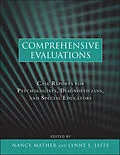An invaluable collection of sample case reports from experts in
child and adolescent assessment
With contributions from authorities in the fields of psychology
and special education-including Dawn Flanagan, Elaine
Fletcher-Janzen, Randy Kamphaus, Nadeen Kaufman, George McCloskey,
Jack Naglieri, Cecil Reynolds, and Gale Roid--Comprehensive
Evaluations provides over fifty sample case reports to help you
draft carefully planned, goal-directed, and comprehensive
evaluations that clearly explain the reasons for a student's
school-related difficulties, from preschool to postsecondary
level.
A wellspring of information for educational professionals,
Comprehensive Evaluations provides models for writing
diagnostic reports to accompany the tests most frequently
administered in the evaluation of children, adolescents, and
adults, including the BASC-2, KABC-II, WAIS-IV, WISC-IV, and WJ
III. The reports reflect various disciplines within psychology and
education, different theoretical perspectives and paradigms, and
span a broad spectrum of disabilities.
The diagnostic reports found within Comprehensive
Evaluations will help:
* Expand your familiarity with widely used test instruments
* Enhance your understanding of the interpretation of test
scores
* Improve your ability to tailor written reports to the purposes
of the evaluation
* Translate assessment results into meaningful treatment
recommendations
* Recognize the differences in what evaluators from various school
districts, agencies, and private practices consider to be a
comprehensive evaluation
* Appreciate how your theoretical perspective and choice of tests
can influence diagnostic conclusions
* Determine a report writing style that meets your needs
Comprehensive Evaluations deftly illustrates how thorough
assessments help empirically pinpoint the reasons a student is
struggling in school, which then allows an evaluator to select the
most appropriate accommodations and interventions to help the
student succeed.
Autorentext
Nancy Mather, PhD, is a Professor of Learning Disabilities
at the University of Arizona. A coauthor on the Woodcock-Johnson
III, she specializes in the areas of assessment, reading, and
writing. She has served as a learning disabilities teacher,
diagnostician, university professor, and educational consultant.
Lynne E. Jaffe, PhD, is an Adjunct Assistant Professor of
Learning Disabilities at the University of Arizona. She maintains a
private practice in evaluation, consultation, and educational
therapy for students with learning disabilities. She is coauthor
with Nancy Mather of Woodcock-Johnson III: Reports,
Recommendations, and Strategies (published by Wiley).
Zusammenfassung
An invaluable collection of sample case reports from experts in child and adolescent assessment
With contributions from authorities in the fields of psychology and special education-including Dawn Flanagan, Elaine Fletcher-Janzen, Randy Kamphaus, Nadeen Kaufman, George McCloskey, Jack Naglieri, Cecil Reynolds, and Gale RoidComprehensive Evaluations provides over fifty sample case reports to help you draft carefully planned, goal-directed, and comprehensive evaluations that clearly explain the reasons for a student's school-related difficulties, from preschool to postsecondary level.
A wellspring of information for educational professionals, Comprehensive Evaluations provides models for writing diagnostic reports to accompany the tests most frequently administered in the evaluation of children, adolescents, and adults, including the BASC-2, KABC-II, WAIS-IV, WISC-IV, and WJ III. The reports reflect various disciplines within psychology and education, different theoretical perspectives and paradigms, and span a broad spectrum of disabilities.
The diagnostic reports found within Comprehensive Evaluations will help:
-
Expand your familiarity with widely used test instruments
-
Enhance your understanding of the interpretation of test scores
-
Improve your ability to tailor written reports to the purposes of the evaluation
-
Translate assessment results into meaningful treatment recommendations
-
Recognize the differences in what evaluators from various school districts, agencies, and private practices consider to be a comprehensive evaluation
-
Appreciate how your theoretical perspective and choice of tests can influence diagnostic conclusions
-
Determine a report writing style that meets your needs
Comprehensive Evaluations deftly illustrates how thorough assessments help empirically pinpoint the reasons a student is struggling in school, which then allows an evaluator to select the most appropriate accommodations and interventions to help the student succeed.
Inhalt
Acknowledgments.
List of Contributors.
Foreword (John O. Willis, Ed.D.).
Introduction.
1 Assessment of Individuals with Autism: Procedures and Pitfalls (Sally Logerquist, Ph.D.).
2 Neuropsychological Evaluation of a Young Child with a Seizure Disorder (Marshall Andrew Glenn, Ph.D.).
3 Language Assessment of a Sibling of a Child with Autism (Dale A. Bailey, M.A., CCC-SLP).
4 Cognitive and Achievement Correlates of Language Disorders (Stephen Camarata, Ph.D., CCC-SLP, and Mary N. Camarata, M.S., CCC-SLP).
5 Comorbidity and Cumulative Effects of Inattention, Poor Emotional Control, and Language Problems on Academic Achievement in Early Childhood (R. W. Kamphaus, Ph.D., and Tara C. Raines, Psy.S.).
6 How a Weakness in Attention Can Mask True Learning Capabilities and Achievement Gains (Eva M. Prince, Ed.S).
7 Associative Memory Disorder: An Unexpected Struggle Resulting in Difficulty with Basic Skill Acquisition (James M. Creed, M.Ed.).
8 Evaluation of a Bilingual Student with a History of Language Delay: Differentiating Between a Language Impairment and Second Language Learning (Brigid Garvin, M.Ed.).
9 Twice-Exceptional: A Gifted Child with Concomitant Learning Disabilities (Aimee Yermish, Psy.D.).
10 An Elementary School Student with a Specific Learning Disability in Reading: Use of the DAS-II to Generate and Test Causal Hypotheses (Colin D. Elliott, Ph.D.).
11 Using a Pattern of Strengths and Weaknesses Approach in a Complex Case (James Hanson, M.Ed.).
12 Learning Is the Best Therapy: The Emotional Consequences of a Learning Disability (Lynne E. Jaffe, Ph.D.).
13 Difference versus Disorder: Nondiscriminatory Assessment of an English Learner Suspected of Learning Disability (Samuel O. Ortiz, Ph.D.).
14 Using the PASS Theory to Uncover Disorders in Basic Psychological Processes: An Example of Specific Learning Disability (Jack A. Naglieri, Ph.D.).
15 Neuropsychological Evaluation of a Child with a Brain Injury at Birth (Sam Goldstein, Ph.D., and Sean Cunningham, M.S.).
16 Missing Out on Early Intervention: The Delay of Appropriate Services for a Child with SLD (Nancy Mather, Ph.D.).
17 Learning Disabilities and Mathematics: A School Psychological Framework (Steven G. Feifer, D.Ed.).
18 The Cognitive Assessment System and the Wechsler Intelligence Scale for Children-IV in a Neuropsychological Context (Tulio M. Otero, Ph.D., and Jack A. Naglieri, Ph.D.).
19 Reestablishing Eligibility and Reevaluation Post Natural Disaster (Tara C. Raines, Psy.S., and Cecil Reynolds, Ph.D.).
20 Psychoeducational Assessment of a C…
